Get the App
For Doctors
Login/Sign-up
About
Health Feed
Find Doctors
Health Packages
AllQ&AsTipsQuizzes
Knee Ligament Reconstruction Questions
Asked for male, 26 years old from Ludhiana
Share
Bookmark
Report
Asked for male, 34 years old from Delhi
Share
Bookmark
Report
Health Query
Share
Bookmark
Report
MBBS, D'Ortho, DNB (Orthopedics), Fellow...read more
Orthopedic Doctor•Mumbai
Hello, if your acl is torn and you're doing a sports activity and if you feel issue of giving away or some twisting off your leg again and again while playing sports I would suggest better to get it operated as there is a high chances that your knee might go early arthritic changes or else you repeat mri done and see status of your knee joint accordingly you can plan treatment as many of them with deficient knee also do better in sports. For more detail you can contact me personally thank you.
450 people found this helpful
Health Query
Share
Bookmark
Report
Immobilization. After your bones are back in position, your doctor might immobilize your joint with a splint or sling for several weeks. How long you wear the splint or sling depends on the joint involved and the extent of damage to nerves, blood vessels and supporting tissues.
Rest your dislocated joint. Don't repeat the action that caused your injury, and try to avoid painful movements.
Apply ice and heat. Putting ice on your injured joint helps reduce inflammation and pain. Use a cold...more
Rest your dislocated joint. Don't repeat the action that caused your injury, and try to avoid painful movements.
Apply ice and heat. Putting ice on your injured joint helps reduce inflammation and pain. Use a cold...more
29 people found this helpful
Health Query
Share
Bookmark
Report
1.wrist flexion and extension
place your forearm on a table on a rolled-up towel for padding with your hand hanging off the edge of the table, palm down.
• move the hand upward until you feel a gentle stretch.
• return to the starting position.
• repeat the same motions with the elbow bent at your side, palm facing up.
2.wrist supinatuon and pronation
• stand or sit with your arm at your side with the elbow bent to 90 degrees, palm facing down.
• rotate your forearm, ...more
place your forearm on a table on a rolled-up towel for padding with your hand hanging off the edge of the table, palm down.
• move the hand upward until you feel a gentle stretch.
• return to the starting position.
• repeat the same motions with the elbow bent at your side, palm facing up.
2.wrist supinatuon and pronation
• stand or sit with your arm at your side with the elbow bent to 90 degrees, palm facing down.
• rotate your forearm, ...more
13 people found this helpful
Health Query
Share
Bookmark
Report
Rest your dislocated joint. Don't repeat the action that caused your injury, and try to avoid painful movements.
Apply ice and heat. Putting ice on your injured joint helps reduce inflammation and pain. Use a cold pack for 15 to 20 minutes at a time. For the first day or two, try to do this every couple of hours during the day. After two or three days, when the pain and inflammation have improved, hot packs or a heating pad may help relax tightened and sore muscles. Limit heat applications t...more
Apply ice and heat. Putting ice on your injured joint helps reduce inflammation and pain. Use a cold pack for 15 to 20 minutes at a time. For the first day or two, try to do this every couple of hours during the day. After two or three days, when the pain and inflammation have improved, hot packs or a heating pad may help relax tightened and sore muscles. Limit heat applications t...more
74 people found this helpful
Asked for male, 32 years old from Bhubaneswar
Share
Bookmark
Report
Knee ligament laxity if you have problem in your legs then it might be due to ligament laxity where your legs would become very weak due to the old ligament injury and that should be treated immediately. Wear knee cap so that you will feel firm while walking or climbing stairs.
This is a general strain and for this you can follow these measures: one keep a pillow right under the knee while sleeping, next is you can keep ice in the painful area for about 5--10 minutes, if pain still persists ...more
This is a general strain and for this you can follow these measures: one keep a pillow right under the knee while sleeping, next is you can keep ice in the painful area for about 5--10 minutes, if pain still persists ...more
49 people found this helpful
Asked for male, 26 years old from Ludhiana
Share
Bookmark
Report
Respected lybrate user..... Maybe your knee brace is important to wear while sleeping.....!!!? But it( knee brace) is not too tightly tied....! Soft , smooth and washed,neat,dried cloth is placed...under your knee brace. But it's just few months".... ! If no pain... Knee functions are normal.....then you lying on your bed normally....! If you want anything about this please consult orthopaedic doctor or Physio therapist.
44 people found this helpful
Asked for male, 26 years old from Ludhiana
Share
Bookmark
Report
Hi.
Its normal nothing to worry about it. After suture removal you will have set of exercises to continue for 6-8 weeks. Knee swelling, stiffness and pain is normal at this stage. Please wear brace while walking which is essential. Mobilize urself little bit. Don't give any complete rest which will affect your muscle power of thigh muscles. If you need any help on exercises contact us. We will help u.
Its normal nothing to worry about it. After suture removal you will have set of exercises to continue for 6-8 weeks. Knee swelling, stiffness and pain is normal at this stage. Please wear brace while walking which is essential. Mobilize urself little bit. Don't give any complete rest which will affect your muscle power of thigh muscles. If you need any help on exercises contact us. We will help u.
Health Query
Share
Bookmark
Report
Dear ,
greetings
description tells me that you might have sub-clinical infection. As you are off antibiotics now, we need to see how your feels after 2-3 wks. Repeat your crp and esr levels. 20 days post surgery there should not be any other cause of fever even though its mild. Swelling will take long time to around 6 months or so. Your doctor may advice culture from knee fluid once your are off antibiotics for about 2 wks. Was the second mri with contrast?
You have more pain in bone...more
greetings
description tells me that you might have sub-clinical infection. As you are off antibiotics now, we need to see how your feels after 2-3 wks. Repeat your crp and esr levels. 20 days post surgery there should not be any other cause of fever even though its mild. Swelling will take long time to around 6 months or so. Your doctor may advice culture from knee fluid once your are off antibiotics for about 2 wks. Was the second mri with contrast?
You have more pain in bone...more
Book appointment with top doctors for Knee Ligament Reconstruction treatment
View fees, clinic timings and reviews
Ask a free question
Get FREE multiple opinions from Doctors
posted anonymously
















